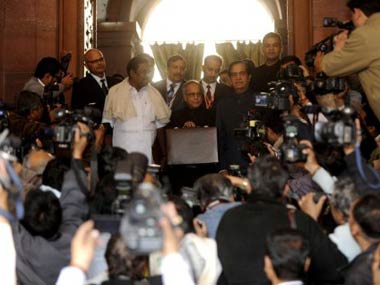As annual rituals go, it is perhaps the most overrated of them all. Some 60-75 days before the annual financial statement of the Union of India is presented in Parliament, a beautifully-constructed, but badly maintained, Lutyens-era monument is shut down for the general public, and the media in particular.
This is a tradition whose origin is shrouded in mystery. It has survived even the brave changes introduced by former Finance Minister Yashwant Sinha, who broke with Whitehall time and reset the clock for the presentation of the Union budget for 1999-2000 to 11 am in the morning. Ever since, the budget is read out in the morning instead of 5 pm in the evening.
Sinha, a former member of the protocol-conscious Indian Administrative Service, did much in his years as finance minister. He did much more for the media and TV industry by breaking away from the shackles of a colonial era clock. Reason: shifting the budget to the morning gives the media more time to dissect and discuss the budget.
[caption id=“attachment_180355” align=“alignleft” width=“380” caption=“Ten days into the New Year and the ministry has once again been shuttered to the public.AFP Photo”]  [/caption]
But Sinha is a changed man these days. He wields a fine toothcomb, going through every crucial piece of economic legislation proposed by the redoubtable Pranab Mukherjee. The comb misses little and spares almost nothing that is out of place with tradition - be it “direct” taxes or even the pocket-pinching “indirect” burdens on expenditure and consumption by the rising middle class.
But this is not a rant on Sinha’s new avatar as an opponent of reform. It’s about the how the finance ministry goes into purdah at this time of the year.
Ten days into the New Year and the ministry has once again been shuttered to the public. It would have happened earlier but for the fact that elections in several states have meant that the 2012-13 budget will have to be presented only around mid-March. On Wednesday, Parliamentary Affairs Minister Pawan Bansal told this writer that the exact dates were being worked upon.
While several experts and former finance ministry officials say the secrecy surrounding the budget’s preparation can, and should, be reduced, the fact is that other arms of the government are following in the footsteps of the finance ministry. From January 2011, the illustrious Planning Commission, chaired by Prime Minister Manmohan Singh himself, has also taken a step backward in the quest for greater transparency in budget-making.
Yojana Bhawan, the Soviet-style office block that houses the Planning Commission, has been declared out-of-bounds to the media due to the forthcoming budget. For those who do not know, the main contribution of our planning mandarins to the central budget is the appropriation of central resources under the head “Gross Budgetary Support”. The commission also holds parleys with North Block officials to allocate “plan” and “non-plan” funds to pet schemes. Why this should need a lockdown is anyone’s guess. The government is anyway planning to do away with the differentiation between plan and non-plan outlays.
There are several other issues that are integral to the debate about the role and place of a government balance-sheet - which is what the budget is - in the modern Indian economy. These questions become even more important in the context of a key aspect of every budget -tax changes. For the past few years, the finance ministry has been trying to usher in a new income tax code as well as revamp the entire architecture of indirect taxes.
Former Finance Minister P Chidambaram initiated the reform that his successor Pranab Mukherjee has been trying to implement. It’s common knowledge though that both efforts are stuck badly. The Direct Taxes Code (DTC) has fallen victim to internal intrigues within the Indian Revenue Service and corporate pressure on the far-reaching proposals in it which will make tax avoidance difficult.
The BJP, which over the past few months has tried to behave as the new Left, is not in support of several aspects of the Code, which remains under review by a Parliamentary panel headed by Yashwant Sinha.
The Goods and Services Tax (GST) is a far more difficult hurdle to cross and even the most optimistic do not expect the UPA to be able to implement these tax reforms this year or even in the next.
Here lies the rub, though. Imagine a scenario where the DTC and GST are implemented. The overall architecture of tax policies will be fully in place, while the rates of tax will also, hopefully, be kept stable for the medium term. That sort of scenario will only give the finance ministry leeway to play around with expenditure. But given the rate at which the current government is enhancing and introducing new giveaway schemes, there may be very little left to do.
Finally, let us draw some inspiration from a far more intellectually robust institution - the Reserve Bank of India, which so far seems to have survived a hostile takeover by the Financial Stability and Development Council chaired by the finance minister. India’s monetary authority, led by former IAS officer Duvvuri Subbarao, last year increased the frequency of policy interventions. That has helped it respond faster to evolving challenges.
So, is it time for the centre to do something similar? Instead of an annual financial statement, can the Indian government consider quarterly financial statements that can be accompanied by reviews of both spending and taxation trends?
After all, corporate India has learnt to do this. Aside from all the work it would involve, the idea would not impose any additional strain, and would allow a finance minister to stand up and command the undivided attention of the nation four times a year.
Siddharth Zarabi is Editor (Economic Policy) and Delhi Bureau Chief at CNBC-TV18


)
)
)
)
)
)
)
)
)



